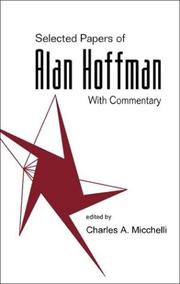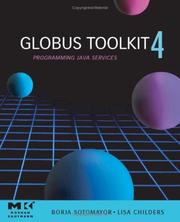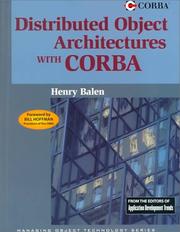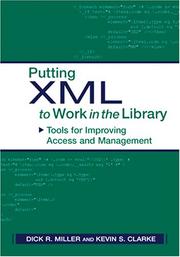| Listing 1 - 7 of 7 |
Sort by
|

ISBN: 128194808X 9786611948085 9812796932 9789812796936 9789810241988 9810241984 9810241984 6611948082 Year: 2003 Publisher: River Edge, N.J. : World Scientific,
Abstract | Keywords | Export | Availability | Bookmark
 Loading...
Loading...Choose an application
- Reference Manager
- EndNote
- RefWorks (Direct export to RefWorks)
Dr Alan J. Hoffman is a pioneer in linear programming, combinatorial optimization, and the study of graph spectra. In his principal research interests, which include the fields of linear inequalities, combinatorics, and matrix theory, he and his collaborators have contributed fundamental concepts and theorems, many of which bear their names. This volume of Dr Hoffman's selected papers is divided into seven sections: geometry; combinatorics; matrix inequalities and eigenvalues; linear inequalities and linear programming; combinatorial optimization; greedy algorithms; graph spectra. Dr Hoffman has supplied background commentary and anecdotal remarks for each of the selected papers. He has also provided autobiographical notes showing how he chose mathematics as his profession, and the influences and motivations which shaped his career.
Combinatorial analysis. --- Programming (Mathematics) --- Mathematical programming --- Goal programming --- Algorithms --- Functional equations --- Mathematical optimization --- Operations research --- Combinatorics --- Algebra --- Mathematical analysis --- Combinatorial analysis --- 681.3*D3 --- 681.3*D3 Programming languages --- Programming languages

ISBN: 9780123694041 0080460038 9780080460031 0123694043 9786610633500 1280633506 Year: 2006 Publisher: Amsterdam ; Boston : Elsevier ; Morgan Kaufmann,
Abstract | Keywords | Export | Availability | Bookmark
 Loading...
Loading...Choose an application
- Reference Manager
- EndNote
- RefWorks (Direct export to RefWorks)
The Globus Toolkit (http://www.globus.org/toolkit/) is a key technology in Grid Computing, the exciting new computing paradigm that allows users to share processing power, data, storage, and other computing resources across institutional and geographic boundaries. Globus Toolkit 4: Programming Java Services provides an introduction to the latest version of this widely acclaimed toolkit. Based on the popular web-based The Globus Toolkit 4 Programmer's Tutorial, this book far surpasses that document, providing greater detail, quick reference appendices, and many additional examples. If yo
Programming --- Information Technology --- General and Others --- Computational grids (Computer systems) --- Internet programming. --- Web services. --- Java (Computer program language) --- Object-oriented programming languages --- JavaSpaces technology --- Application software --- Cloud computing --- Computer programming --- Grid computing --- Grids, Computational (Computer systems) --- Computer systems --- Cyberinfrastructure --- Internet programming --- Web services --- 681.3*D3 --- 681.3*D3 Programming languages --- Programming languages

ISBN: 0511584962 0511001762 9780511001765 9780511584961 9780521654180 0521654181 Year: 2000 Publisher: Cambridge : Cambridge University Press,
Abstract | Keywords | Export | Availability | Bookmark
 Loading...
Loading...Choose an application
- Reference Manager
- EndNote
- RefWorks (Direct export to RefWorks)
Distributed Object Architectures with CORBA is a guide to creating a software architecture comprising distributed components. While it is based on OMG's Common Object Request Broker Architecture (CORBA) standard, the principles also apply to architecture built with other technology (such as Microsoft's DCOM). As ORB products evolve to incorporate new additions to CORBA, the knowledge and experience required to build stable and scalable systems is not widespread. With this book the reader can develop the skills and knowledge that is necessary for building such systems. The book assumes a familiarity with object-oriented concepts and the basics of CORBA. Software developers who are new to building systems with CORBA-based technologies will find this book a useful guide to effective development.
CORBA (Computer architecture) --- Object-oriented methods (Computer science) --- Distributed operating systems (Computers) --- Operating systems (Computers) --- Object development methods (Computer science) --- Object orientation (Computer science) --- Object-oriented development (Computer science) --- Object technology (Computer science) --- System design --- Common Object Request Broker Architecture (Computer architecture) --- Computer architecture --- Middleware --- Design and construction. --- 681.3*D3 --- 681.3*D3 Programming languages --- Programming languages

ISBN: 0838908632 0838998593 9780838998595 9780838908631 Year: 2004 Publisher: Chicago American Library Association
Abstract | Keywords | Export | Availability | Bookmark
 Loading...
Loading...Choose an application
- Reference Manager
- EndNote
- RefWorks (Direct export to RefWorks)
Optimize information access across platforms, vendors, andthroughout your library! Offering the advantages of both control and flexibility, the authors show how librarians using XML can begin to selectively impose control in the haphazard digital environment.
XML (Document markup language) --- Cataloging --- XML (Langage de balisage) --- Catalogage --- Data processing --- Informatique --- Digital libraries --- Libraries --- 025:681.3 --- 025 --- 681.3*D3 --- 681.3*D3 Programming languages --- Programming languages --- 025 Bibliotheekbeheer --- Bibliotheekbeheer --- 025:681.3 Bibliotheekautomatisering --- Bibliotheekautomatisering --- Extendible Markup Language (Document markup language) --- eXtensible Markup Language (Document markup language) --- Document markup languages --- Digital curation --- Digital media collections --- Digital media libraries --- Digital repositories --- Electronic libraries --- Electronic publication collections --- Electronic publication libraries --- Electronic text collections --- Repositories, Digital --- Virtual libraries --- Information storage and retrieval systems --- Web archives --- Library catalogs --- Automation --- Digital libraries. --- Data processing.
Book
ISBN: 9783642024757 9783642024740 3642024742 3642024750 Year: 2009 Publisher: Berlin, Heidelberg : Springer Berlin Heidelberg : Imprint: Springer,
Abstract | Keywords | Export | Availability | Bookmark
 Loading...
Loading...Choose an application
- Reference Manager
- EndNote
- RefWorks (Direct export to RefWorks)
The aim of this book is to teach computer programming using examples from mathematics and the natural sciences. We have chosen to use the Python programming language because it combines remarkable power with very clean, simple, and compact syntax. Python is easy to learn and very well suited for an introduction to computer programming. Python is also quite similar to Matlab and a good language for doing mathematical computing. It is easy to combine Python with compiled languages, like Fortran, C, and C++, which are widely used languages for scientific computations. A seamless integration of Python with Java is offered by a special version of Python called Jython. The examples in this book integrate programming with applications to mathematics, physics, biology, and finance. The reader is expected to have knowledge of basic one-variable calculus as taught in mathematics-intensive programs in high schools. It is certainly an advantage to take a university calculus course in parallel, preferably containing both classical and numerical aspects of calculus. Although not strictly required, a background in high school physics makes many of the examples more meaningful.
Numerical analysis --- Computer. Automation --- informatica --- algoritmen --- numerieke analyse --- Programming --- informaticaonderzoek --- wiskunde --- computerbesturingssystemen --- programmeren (informatica) --- Computer science --- EPUB-LIV-FT LIVMATHE LIVSTATI SPRINGER-B --- Python (Computer program language). --- Computer science. --- Software engineering. --- Mathematics of Computing. --- Computational Science and Engineering. --- Programming Techniques. --- Software Engineering/Programming and Operating Systems. --- Numerical and Computational Physics, Simulation. --- Computer software engineering --- Engineering --- Informatics --- Science --- Python (Computer program language) --- 681.3*D3 --- 681.3*D3 Programming languages --- Programming languages --- Scripting languages (Computer science) --- Computer science—Mathematics. --- Computer mathematics. --- Computer programming. --- Physics. --- Natural philosophy --- Philosophy, Natural --- Physical sciences --- Dynamics --- Computers --- Electronic computer programming --- Electronic data processing --- Electronic digital computers --- Programming (Electronic computers) --- Coding theory --- Computer mathematics --- Mathematics
Book
ISBN: 9781107029576 1107029570 9781139342131 1107306841 9781107306844 9781107314597 1107314593 1139342134 9781107301757 1107301750 9781107309043 1107309042 1107237300 9781107237308 1107254868 9781107254862 Year: 2013 Publisher: Cambridge : Cambridge University Press,
Abstract | Keywords | Export | Availability | Bookmark
 Loading...
Loading...Choose an application
- Reference Manager
- EndNote
- RefWorks (Direct export to RefWorks)
Types are the central organizing principle of the theory of programming languages. In this innovative book, Professor Robert Harper offers a fresh perspective on the fundamentals of these languages through the use of type theory. Whereas most textbooks on the subject emphasize taxonomy, Harper instead emphasizes genetics, examining the building blocks from which all programming languages are constructed. Language features are manifestations of type structure. The syntax of a language is governed by the constructs that define its types, and its semantics is determined by the interactions among those constructs. The soundness of a language design - the absence of ill-defined programs - follows naturally. Professor Harper's presentation is simultaneously rigorous and intuitive, relying on elementary mathematics. The framework he outlines scales easily to a rich variety of language concepts and is directly applicable to their implementation. The result is a lucid introduction to programming theory that is both accessible and practical.
Programming languages (Electronic computers). --- Computers --- Programming Languages --- General. --- Programming languages (Electronic computers) --- COMPUTERS / Programming Languages / General --- 681.3*D33 --- 681.3*D3 --- 681.3*F33 --- 681.3*F3 --- 681.3*F3 Logics and meanings of programs (Theory of computation) --- Logics and meanings of programs (Theory of computation) --- 681.3*D3 Programming languages --- Programming languages --- 681.3*D33 Languages constructs: abstract data types; concurrent programming structures;control structures; coroutines (Programming languages) --- Languages constructs: abstract data types; concurrent programming structures;control structures; coroutines (Programming languages) --- Computer languages --- Computer program languages --- Computer programming languages --- Machine language --- Electronic data processing --- Languages, Artificial --- 681.3*F33 Studies of program constructs: control primitives; functional constructs; program and recursion schemes; type structure (Logics and meanings of programs)-- See also {681.3*D32}; {681.3*D33} --- Studies of program constructs: control primitives; functional constructs; program and recursion schemes; type structure (Logics and meanings of programs)-- See also {681.3*D32}; {681.3*D33}

ISBN: 1280700041 9786610700042 1430200847 1590594703 Year: 2006 Publisher: Berkeley, CA : Apress : Imprint: Apress,
Abstract | Keywords | Export | Availability | Bookmark
 Loading...
Loading...Choose an application
- Reference Manager
- EndNote
- RefWorks (Direct export to RefWorks)
Sun's new lightweight Java Enterprise Edition (EE) 5 is an extremely powerful platform for developing enterprise-level Java-based applications, primarily for the server. This book shows you how to harness that power, examining how the pieces of the new Java EE 5 platform fit together, including the redesigned annotations-driven EJB 3 spec as well as JavaServer Faces (JSF), integrated into the platform for the first time. Hands-on tutorials are also included, along with clear explanations and working code examples. You will grow to take the next step—from writing client-side desktop applications to writing enterprise applications. You will also learn how to use the individual APIs and tools in the Java EE 5 platform, and how to merge these to create your own enterprise applications.
Java (Computer program language) --- Object-oriented programming languages. --- Object-oriented languages (Computer program languages) --- OO languages (Computer program languages) --- OOLs (Computer program languages) --- OOP languages (Computer program languages) --- Programming languages (Electronic computers) --- Object-oriented programming languages --- JavaSpaces technology --- Java (Langage de programmation) --- ejb (enterprise java beans) --- j2ee (java 2 platform, enterprise edition) --- java --- jdbc (java database connectivity) --- sql --- 681.3*D211 --- 681.3*D22 --- 681.3*D33 --- 681.3*D3 --- 681.3*D22 Tools and techniques: decision tables; flow charts; modules and interfaces; programmer workbench; software libraries; structured programming; top-down programming; user interfaces (Software engineering) --- Tools and techniques: decision tables; flow charts; modules and interfaces; programmer workbench; software libraries; structured programming; top-down programming; user interfaces (Software engineering) --- 681.3*D33 Languages constructs: abstract data types; concurrent programming structures;control structures; coroutines (Programming languages) --- Languages constructs: abstract data types; concurrent programming structures;control structures; coroutines (Programming languages) --- 681.3*D3 Programming languages --- Programming languages --- Software architectures: data abstractio, domain-specific architectures, information hiding, languages (e.g. description, interconnection, definition), patterns (e.g. client/server, pipeline, blackboard) --- Java (Computer program language). --- Software engineering. --- Java. --- Software Engineering/Programming and Operating Systems. --- Computer software engineering --- Engineering
| Listing 1 - 7 of 7 |
Sort by
|

 Search
Search Feedback
Feedback About
About Help
Help News
News